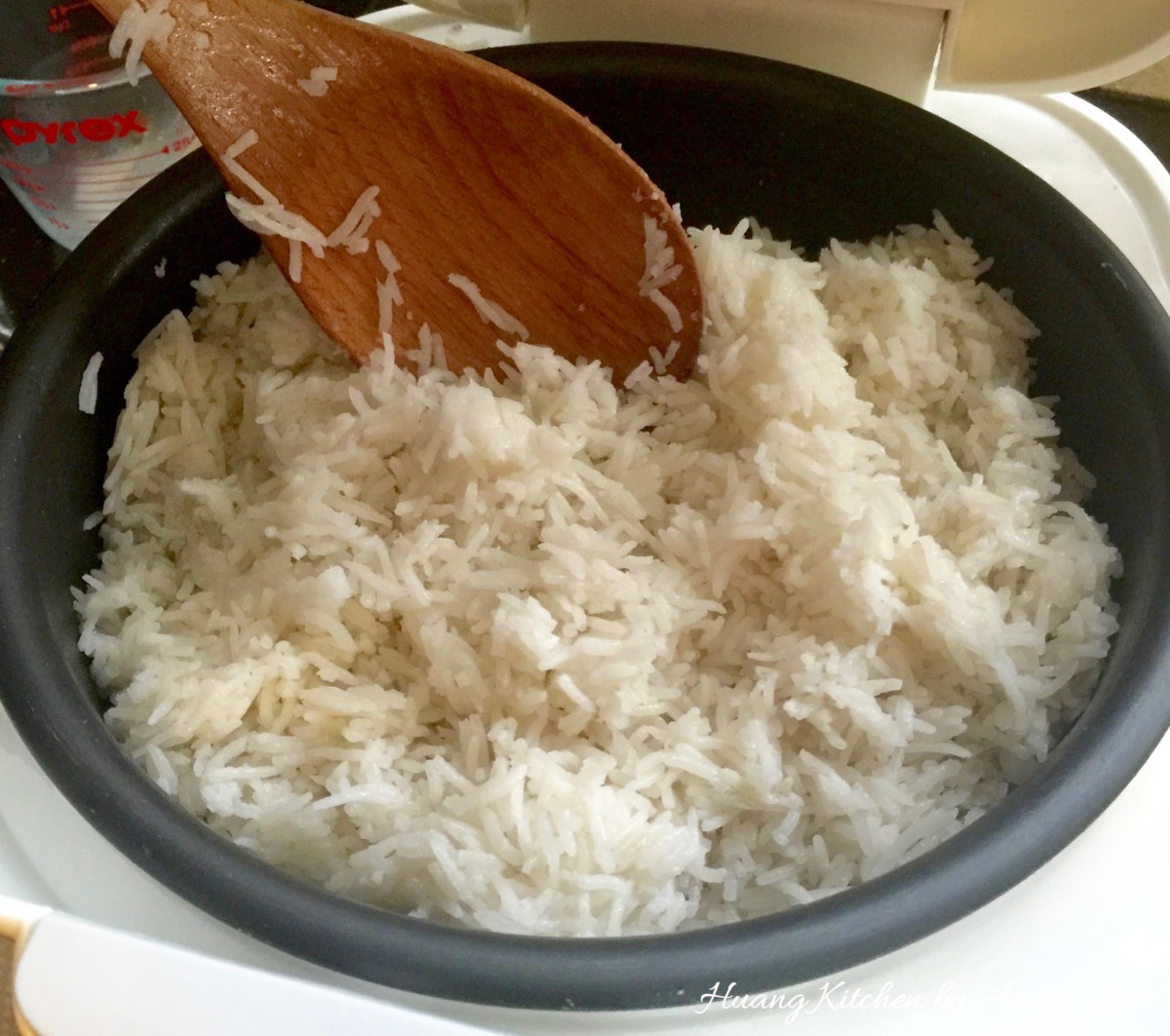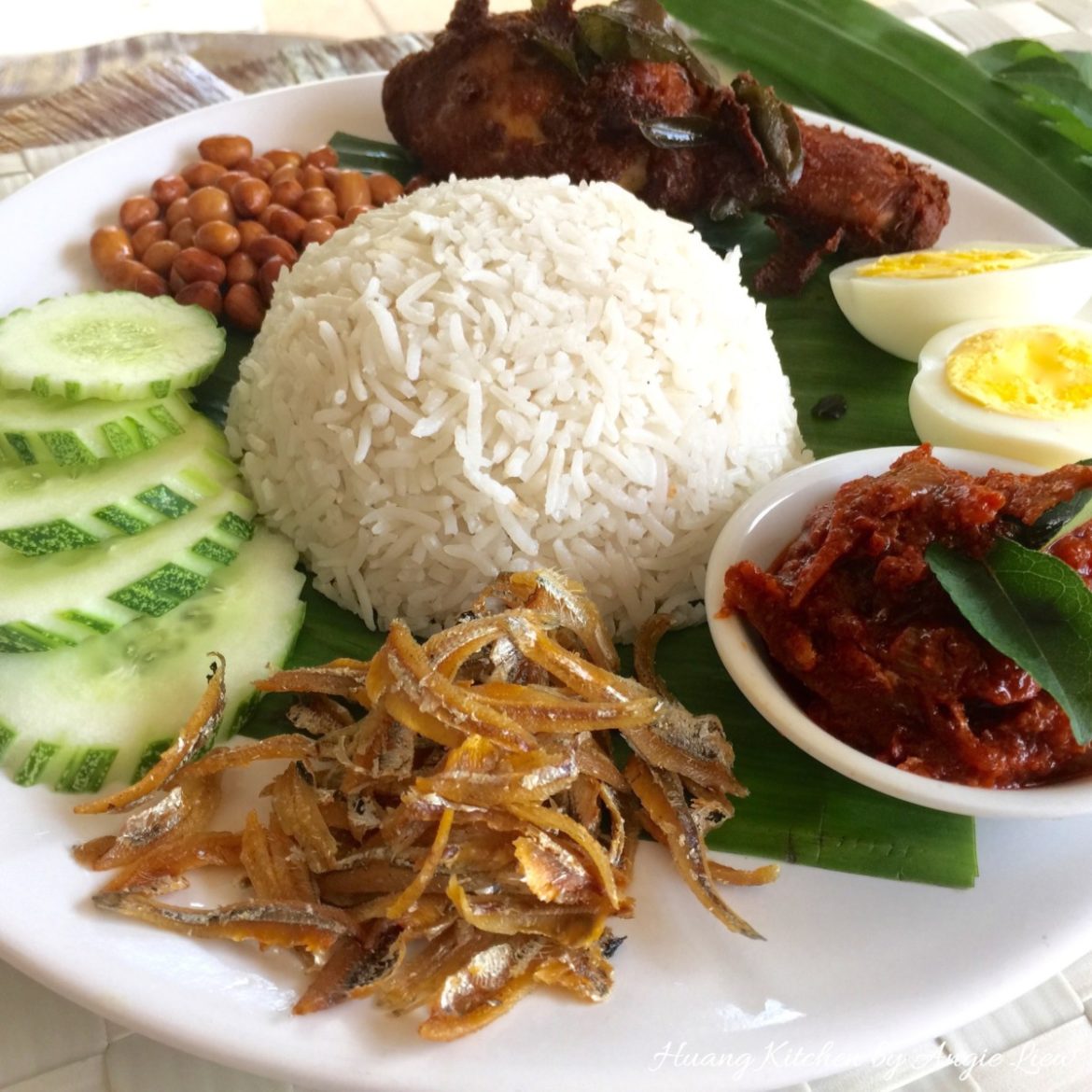
Undoubtedly Malaysia’s Most Famous Dish: Nasi Lemak
Nasi Lemak (Coconut Milk Rice 椰浆饭) is undoubtedly the national dish that represents Malaysia and most probably the most popular traditional dish in Malaysia, to locals and foreigners alike. It is one dish that binds everyone together, despite the wide diversity of cultures and cuisines in Malaysia.
A truly remarkable Nasi Lemak (Coconut Milk Rice) is not to be taken lightly. It constitutes of good quality rice cooked in rich and creamy coconut milk with screw pine leaves infused during the cooking process. This is key to create the best flavours and texture in the nasi lemak rice. Hence, much effort is required to prepare this legendary dish.

Key Components Of A Plate Of Traditional Nasi Lemak
Sambal ikan bilis is a very important component for the cooking of Nasi Lemak. It is a vital accompaniment and a MUST have dish for Nasi Lemak (Coconut Milk Rice).
To make the sambal, first fry the dried anchovies and then cook them with a spice paste, tamarind juice and the flavourful shrimp paste. And what we have is a much craved for anchovy dish, sambal ikan bilis.

Ways To Enjoy A Truly Authentic Nasi Lemak
A typical plate of Nasi Lemak is served alongside fried anchovies, roasted peanuts, sliced cucumber, hard-boiled eggs and an addictive spicy sambal. For more elaborate versions, spicy fried chicken, chicken rendang, curry chicken are also included. See recipes below for perfect accompaniments to the classic nasi lemak.
Related recipes can be found here:
Ayam Goreng Berempah (Malay Spiced Fried Chicken)
Traditional Malaysian Chicken Rendang (Rendang Ayam)
Home Style Chicken Curry
See Other Recipes in
Huang Kitchen Nasi Lemak Recipe Collection:
Nasi Lemak (Coconut Milk Steamed Rice) 椰浆饭
Tap or Hover to Adjust Servings
Ingredients
Coconut Milk Rice
- 1 kg rice, preferably basmati rice, 5 1/2 cups
- 6 cups water
- 200 ml Thick coconut milk, 1 coconut
- 3 pandan leaves/screwpine leaves, knotted and slightly bruised
- 2 stick lemongrass, crushed
- 1 ginger, crushed
- 1 tsp sugar, to taste
- 2 tsp salt, to taste
Sambal Ikan Bilis (Chilli Anchovies)
- 3 cups ikan bilis (dried anchovies)
- 1 cup oil
- 3 clove garlic
- 12 shallots
- 30 dried chillies, or 150ml chilli paste
- 3 tsp belacan (prawn paste)
- 1 tsp salt
- 3 tbsp sugar
- 3 red onions, cut into rings
- 1 tamarind pulp, 3 ping pong size
- 3 cups water, soaked tamarind pulp
Other Ingredients
- 6 eggs, hard boiled, cut into halves
- 1 cucumber, cut into slices
- 2 cups Peanuts
 First rinse the rice and drained.
First rinse the rice and drained. Place the drained rice in a rice cooker.
Place the drained rice in a rice cooker. Pour 50ml (1/4) of the thick coconut milk into a measuring cup.
Pour 50ml (1/4) of the thick coconut milk into a measuring cup. Then dilute with some water.
Then dilute with some water. Add in salt and sugar and stir to mix.
Add in salt and sugar and stir to mix. Pour the coconut milk mixture into the drained rice in the rice cooker.
Pour the coconut milk mixture into the drained rice in the rice cooker. Add in additional water to make sure the volume of the watery coconut milk is the same as the rice in volume. (Altogether is about 6 cups).
Add in additional water to make sure the volume of the watery coconut milk is the same as the rice in volume. (Altogether is about 6 cups). Lastly add in crushed ginger, lemongrass and screw pine leaves.
Lastly add in crushed ginger, lemongrass and screw pine leaves. Switch on the rice cooker and cook the rice
Switch on the rice cooker and cook the rice When the rice reaches warming stage, add the balance (150ml) of the thick coconut milk.
When the rice reaches warming stage, add the balance (150ml) of the thick coconut milk. Stir the rice. Close the lid and continue cooking until done.
Stir the rice. Close the lid and continue cooking until done. Fluff up the rice and serve it hot.
Fluff up the rice and serve it hot. Then prepare to cook the sambal by having ready the ingredients needed.
Then prepare to cook the sambal by having ready the ingredients needed. Blend soaked and deseeded dried chillies to chilli paste and put aside.
Blend soaked and deseeded dried chillies to chilli paste and put aside. Next, blend together shallots and garlic and set aside for later use.
Next, blend together shallots and garlic and set aside for later use. Rinse the dried anchovies in cold water and leave to dry thoroughly.
Rinse the dried anchovies in cold water and leave to dry thoroughly. Heat some oil in wok until almost smoking and fry the anchovies over low heat until they turn light brown and crisps. Strain and set aside.
Heat some oil in wok until almost smoking and fry the anchovies over low heat until they turn light brown and crisps. Strain and set aside. Put aside a portion of the fried anchovies as a side dish to serve with the nasi lemak.
Put aside a portion of the fried anchovies as a side dish to serve with the nasi lemak. Slice the onions into rings.
Slice the onions into rings. Soak the tamarind pulp in water for 15 minutes. Squeeze the tamarind to extract the flavour into the water. Using a strainer, drain the pulp and keep the tamarind juice.
Soak the tamarind pulp in water for 15 minutes. Squeeze the tamarind to extract the flavour into the water. Using a strainer, drain the pulp and keep the tamarind juice. To fry the sambal, first heat some oil in wok. Add in the prawn paste and fry until it releases its flavour.
To fry the sambal, first heat some oil in wok. Add in the prawn paste and fry until it releases its flavour. Then add in chilli and spice paste and fry until fragrant.
Then add in chilli and spice paste and fry until fragrant. Add in the onion rings followed by the fried dried anchovies and stir well.
Add in the onion rings followed by the fried dried anchovies and stir well. Then add in the tamarind juice.
Then add in the tamarind juice. Next, season with salt and sugar.
Next, season with salt and sugar. Simmer over low heat until gravy thickens and we're done!
Simmer over low heat until gravy thickens and we're done! Set aside to be served at room temperature alongside the steamed coconut milk rice.
Set aside to be served at room temperature alongside the steamed coconut milk rice. Rinse the raw peanuts and drain the water.
Rinse the raw peanuts and drain the water. Heat a clean wok until it begins to smoke. Put raw peanuts (and salt/ optional) in to fry. Lower the heat and stir fry constantly for 5 minutes.
Heat a clean wok until it begins to smoke. Put raw peanuts (and salt/ optional) in to fry. Lower the heat and stir fry constantly for 5 minutes. Add in a drop or two of vegetable oil and continue to fry with a quick to and fro motion until they begin to turn brown and coated with the oil.
Add in a drop or two of vegetable oil and continue to fry with a quick to and fro motion until they begin to turn brown and coated with the oil. Remove and set aside to be served with the nasi lemak.
Remove and set aside to be served with the nasi lemak. To make the perfect hard boiled eggs, first pour water into a pot. Add the eggs. Then switch on the flame. At boiling point, cover the pot and switch off the flame and let cook for another 15 minutes. To keep the yolk in the centre for better presentation, stir the pot occasionally when the egg is cooking.
To make the perfect hard boiled eggs, first pour water into a pot. Add the eggs. Then switch on the flame. At boiling point, cover the pot and switch off the flame and let cook for another 15 minutes. To keep the yolk in the centre for better presentation, stir the pot occasionally when the egg is cooking. Remove the egg shells when they are still warm. Using a sharp knife, slice the eggs in halves when they have cooled to ensure that the yolks are sliced smoothly. Then set aside to serve with the hot coconut milk rice.
Remove the egg shells when they are still warm. Using a sharp knife, slice the eggs in halves when they have cooled to ensure that the yolks are sliced smoothly. Then set aside to serve with the hot coconut milk rice. For cucumber, try to use the local variety. Cut off both ends and peel the cucumber. Then slice into thick slices. There is no need to remove the seeds.
For cucumber, try to use the local variety. Cut off both ends and peel the cucumber. Then slice into thick slices. There is no need to remove the seeds. And we're done! Dish up the hot coconut milk rice on a plate and serve alongside with all the others. Enjoy!
And we're done! Dish up the hot coconut milk rice on a plate and serve alongside with all the others. Enjoy!








13 comments
Hi Angie,
Do I use fresh coconut or packet coconut milk?
Try to use fresh coconut milk for extra fragrance. Let me know how it turns out. Enjoy!
Hi Angie how many ml for your standard of 1 cup ?
Thanks
! cup or 200 ml coconut milk should be good.
Angie if I make 2 measuring cups of rice what would the portions of coco u milk n water be? And can I use canned coconut milk?
You can use half the portion of coconut milk (100 ml) and yes, canned coconut milk is fine but the fresh one obviously taste better. Thanks
Thank you for your guidance. Nicely done. Turns out very well for me. Every guest of mine had a lovely time with the wonderful dish. Thanks.
Great you and your guests enjoyed the dish. Thanks for sharing your thoughts. You are most welcome too.
Hello, just using a rice cooker change the recipe, or ingredient proportions in anyway for the coconut rice part of your recipe? Thank you!
For a beginner, a simple recipe, step by step with photos, this is very helpful,
Thanks for your comment.
This is how it spell basmati not brasmati?
Hi Azman, thank you for pointing that out and for visiting my website 🙂